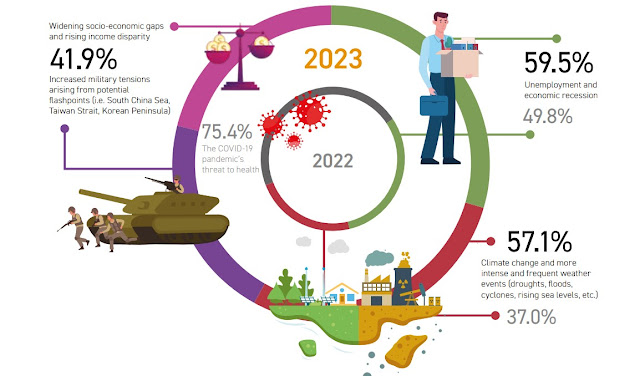- Get link
- X
- Other Apps
- Get link
- X
- Other Apps
THE 2023 edition of the State of Southeast Asia Survey conducted by the ASEAN Studies Centre at the ISEAS – Yusof Ishak Institute in Singapore reveals that Southeast Asia’s top preoccupations are with recessionary pressures, potential military tensions, and a "slow and ineffective" Association of South East Asian Nations (ASEAN).
 |
| The Top three challenges facing Southeast Asia - State of Southeast Asia 2023 Survey |
The People’s Republic of China (PRC) continues to be regarded as the most influential economic and political power in the region and the United States of America (USA) has sharpened its edge over the PRC in the event of a forced choice while Japan remains its most trusted major power.
The survey was conducted from 14 November 2022 to 6 January 2023 in English, Bahasa Indonesia, Khmer, Lao, Burmese, Thai and Vietnamese, gathering views from 1,308 respondents from academia, business, government, civil society and the media.
The fifth edition of this region-wide survey covers a broader and more diverse set of questions including the Russian invasion of Ukraine; tensions in the Taiwan Strait; ASEAN’s Five-Point Consensus for Myanmar; Timor-Leste’s accession to ASEAN; the USA-led Indo-Pacific Economic Framework for Prosperity (IPEF); the PRC’s Global Security Initiative (GSI); the USA-PRC rivalry and its impact on Southeast Asia; levels of trust in the major powers; and indicators of soft power.
Coming out of the pandemic, unemployment and economic recession are billed as the region’s top challenges, followed by the severe impacts of climate change, the widening of socio-economic gaps and rising income disparity as well as potential military tensions.
A majority of respondents express concern over the Russian invasion of Ukraine and almost half fear that an outbreak of hostilities in the Taiwan Strait will destabilise the region. The survey also found that respondents are concerned that ASEAN remained ineffective in coping with political and economic developments, and that ASEAN may become an arena for major power competition.
The PRC remains the undisputed influential economic power in the region and also continues to be seen as the most influential political and strategic power, outpacing the US by significant albeit reduced margins compared to 2022. However, misgivings about the PRC’s influence also remain with around two-thirds of respondents expressing concern about the PRC’s influence.
On specific country-led initiatives such as the USA-led Indo-Pacific Economic Framework for Prosperity (IPEF) or the PRC-led Global Security Initiative (GSI), the region preferred to sit on the fence with 41.8% of respondents expressing uncertainty about the IPEF and 44.5% saying that they had either little or no confidence in the benefits of the GSI. Two strong reasons for the uncertain attitudes towards the IPEF were the need to see what emerged from the negotiations (35.5%) and a complaint that there was little information available (27.2%). Of those who expressed poor confidence in the GSI, a third were concerned that USA-PRC tensions would increase, and another third feared that ASEAN would be forced to take sides.
Hypothetical alignment
A hypothetical forced question on who ASEAN should choose to align itself with, a higher proportion of respondents chose the USA over the PRC as compared to the findings in 2022.
With regard to moving the Myanmar situation forward, slightly more than a third want to see ASEAN engage actively in independent dialogue with all key stakeholders, including the shadow National Unity Government.
Japan remains the most trusted major power in terms of “doing the right thing” to provide global public goods, followed by the US and the EU. Japan also shines in the soft power domain in terms of tourism while the USA’s soft power continues to hold strong attraction in tertiary education.
Mr Choi Shing Kwok, Director and CEO of ISEAS - Yusof Ishak Institute and Head of the ASEAN Studies Centre, said the results reflect “heightened regional concerns about economic and geopolitical issues that can adversely affect the region’s interests in the short to medium term. They also show that the region remains open to both the US and China playing constructive roles and welcomes the presence of other major powers, while not discounting that ASEAN itself can exercise greater agency to direct its own future in a more challenging environment.”
The full 2023 survey findings (and previous editions) can be freely downloaded here.

